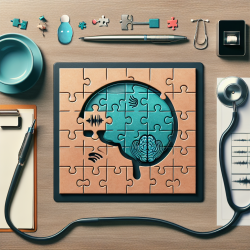Clinicians, Are You Missing This Crucial Element in Psychiatric Treatment? Discover the Secret to Better Outcomes!As a clinician, your goal is to provide the best possible outcomes for your patients. But are you aware of the non-specific components that can significantly impact the effectiveness of psychiatric treatments? According to a conceptual review by Priebe et al. (2019), non-specific components such as communication skills, empathy, and treatment framing play a crucial role in patient outcomes. Here’s how you can leverage these findings to improve your practice.
Understanding Non-Specific Components
Non-specific components refer to aspects of treatment that are not directly related to the specific therapeutic methods but still significantly influence outcomes. These include:
- General Verbal Communication
- Non-Verbal Communication
- Treatment Presentation and Framing
- Decision-Making
General Verbal Communication
Effective verbal communication starts from the very first contact. Research shows that how clinicians introduce themselves and explain what to expect can set the tone for the entire treatment process. For example, clear and empathetic communication has been linked to better patient adherence and more favorable clinical outcomes.
Non-Verbal Communication
Non-verbal cues such as posture, eye contact, and tone of voice can convey empathy and build rapport. Studies have shown that positive non-verbal communication can lead to higher patient satisfaction and better treatment adherence.
Treatment Presentation and Framing
How you frame treatment options can significantly influence patient expectations and outcomes. For instance, presenting a treatment as having a 30% chance of success versus a 70% chance of failure can affect how patients perceive and engage with the treatment.
Decision-Making
Involving patients in the decision-making process is crucial for better outcomes. Shared decision-making has been linked to improved symptom management and higher patient satisfaction. Tools like decision aids can facilitate this process, helping both clinicians and patients make informed choices.
Practical Steps for Clinicians
Based on the findings from Priebe et al. (2019), here are some actionable steps you can take:
- Enhance your communication skills through brief training courses.
- Use video recordings of consultations to identify areas for improvement.
- Implement decision aids to involve patients in treatment decisions.
- Focus on both verbal and non-verbal communication to build a positive therapeutic relationship.
Conclusion
Non-specific components are often overlooked but are essential for improving psychiatric treatment outcomes. By focusing on communication skills, empathy, and patient involvement, you can make a significant difference in your patients' lives.To read the original research paper, please follow this link:
What can clinicians do to improve outcomes across psychiatric treatments: a conceptual review of non-specific components.










